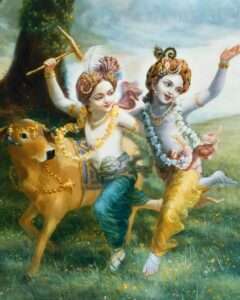 There are six types of avatars:
There are six types of avatars:
- Purusa Avatara,
- Lila Avatara,
- Guna Avatara,
- Manvantara-avatara,
- Saktyavesa Avatara and
- Rudra Avatara.
All of them, directly or indirectly, come from Narayana, as mentioned by Sri Jiva in section eight.
Sri Jiva describes Narayana as the Lord of Vaikuntha, endowed with all the opulences of Krishna (aisvarya), but devoid of His sweetness (madhurya).
In this section, the Gosvami Maharaja describes the eternal activity of the Lord in terms of playing in Vaikuntha (the eternal universe of Krishna and Narayana), which is beyond the material universe. This infinite transcendental world has nothing to do with ours, which is temporary, limiting, and dark. For this reason, Vaikuntha is also called Viraja, the place devoid of any material element (‘vi’ is a negation, ‘rajah’ is material passion). Vaikuntha is therefore completely transcendental, a place where nothing material can ever happen.
The origin of all these partial aspects of Truth is Krishna and here the author of Tattva-sandarbha affirms this not only on the basis of his own understanding and belief, but refers to a considerable number of scriptural passages, the main one being the famous verse 1.3.28 of the Bhagavatam, which says:
ete camsa-kalah pumsah
krishnas tu bhagavan svayam
indari-vyakulam lokam
mrdayanti yuge yuge
In the third chapter of the First Canto, Suta Gosvami speaks of numerous Avataras and at the end declares that “of all of them, Krsna is the Supreme Personality of Godhead.” This means that He is the origin of everything and the Ultimate and Supreme God.
This is also attested to by the sages of Naimisaranya in the first chapter of the Bhagavatam, in which they testify to the supremacy of Krsna as explicitly as possible.
“All blessings to you, O Suta Gosvami. You know for what purpose the Supreme Personality of Godhead appeared in the womb of Devaki as the son of Vasudeva.” (Srimad-Bhagavatam 1.1.12)
The words bhagavan (the Supreme Personality of Godhead), devakyam and vasudevasya cannot indicate anything other than the transcendental Krsna generated by Devaki and Vasudeva.
“… we are eager to learn about the Personality of Godhead and His incarnations…” (Srimad-Bhagavatam 1.1.13)
“Living beings who are caught up in the complexities of birth and death can be released immediately by chanting even unconsciously the Holy Name of Krsna.” (Srimad-Bhagavatam 1.1.14)
Who else has such power but the Supreme Lord?
“Sri Krishna, the Supreme Personality of Godhead, together with Balarama, played the role of a human being and, thus masked, performed many superhuman acts.” (Srimad-Bhagavatam 1.1.20)
The approach to Balarama (as well as in the verses preceding Vasudeva and Devaki) leaves little room for mental speculators who do not want to accept the natural conclusion of the Puranas.
“Since Sri Krishna, the Absolute Truth (krsne brahmanye), the Lord of all mystical powers, departed for His abode, please tell us in whom the religious princes have taken refuge.” (Srimad-Bhagavatam 1.1.23)
These are just a few of the hundreds of verses found in the Bhagavata Purana that attest to the supreme divinity of Sri Krishna.
For critics who argue that Krishna’s thesis of absolute supremacy is rarely mentioned, we recommend learning to read the scriptures carefully before embarking on disastrous commentaries. To these was dedicated the admonition of Sri Jiva which we find in verse six; such abhaktas pass off their ignorance as knowledge and confuse innocent people. This, a Vaishnava saint cannot tolerate.
This is a section of the book “Tattva Sandarbha”, in English.
To buy the complete book, click here



Leave a Reply